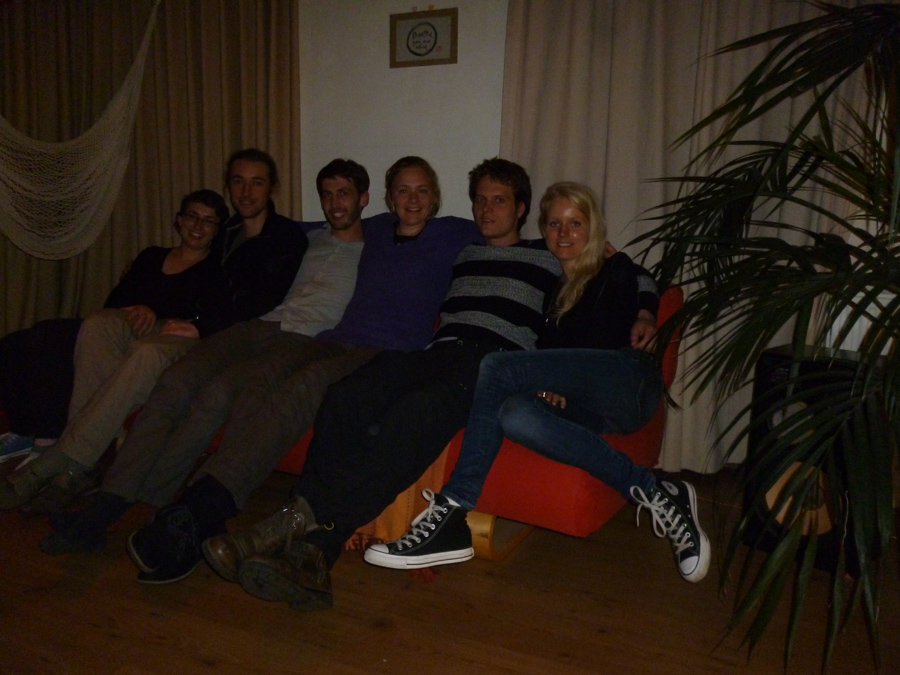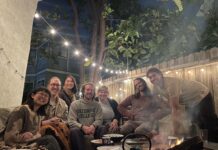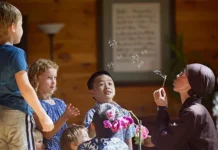Sangha of the Month for April 2014: Wake Up Groningen

A Conversation with Andreas, one of the Sangha Facilitators
Q: Please introduce yourself and how you got into Wake Up.
My name is Andreas. I am 31 years old and I come from Wake Up Groningen, in the north of the Netherlands.
I was introduced by my former girlfriend to join the sangha. Before this I was doing Mindfulness-based stress reduction (MBSR) and Vipassana meditation.
Q: How did all of you decide that the Sangha practice would be in the Plum Village tradition?
We were practicing for a while when we decided that it would be nice to be part of a bigger movement. Romke and Nadine were going to Wake Up retreats at the time and suggested us to join Wake Up. We decided to make our sangha a Wake Up sangha, so it would be easier for other people to find us.
Not much changed at that time, so there was no need for a big discussion about it. Recently our sangha is getting more and more connected with the other sanghas in the Netherlands, so we are now more involved in the Wake Up movement. More people of our sangha are going to retreats and events. Also Romke and I are contributing to Wake Up Netherlands.
Q: On average, how many people attend the sangha?
Around 8 people join our sangha meetings. Sometimes it’s less, and sometimes it’s more. There is a group of people that is coming almost every week.
Q: When and how often you meet?
We meet once a week on Tuesday nights from 20:30 to around 23:00.
Q: Do you guys hang out afterwards or you just have a meditation session?
Usually we drink tea afterwards and talk a bit. It can happen that the host is really tired, so he wants to go to bed.
Q: Outside the sangha gatherings, do you guys organize activities to spend time or get to know each other?
We do days of mindfulness (DOM) or silent days. We’ve been doing that for two years, once or twice a year. Lately, we’ve been going to bare feet dance evenings. Also, we do a potluck once or twice a year. When there are special cultural activities in the city, sometimes we hook up to go together.
Q: When you organize DOM, is it only for Wake Up Groningen or do you also invite other sanghas in the Netherlands?
Until now, it used to be Wake Up Groningen. Next time we will invite other sanghas. More recently we got to know a lot of people from other sanghas, so it feels more natural to invite them. We also did an event in Groningen from Wake Up Netherlands. One of our sangha members is also a member of the all-ages sangha, so there is a connection. The all-ages sangha is interested in the well-being of our sangha. They donated five books of Thay to our sangha.
Q: Does your DOM last the whole day?
It depends on several things. For instance the location, the weather and the people who are coming. We don’t have a standard format, but we usually prepare at the last minute.
Q: Within your sangha, have you had to face any challenges? Or has it been pretty much smooth?
In general, it has been smooth. It has been more like, how do we make this evening work and who’s going to facilitate the sangha meeting. We used to be very democratic and all of us as a sangha would discuss the future of the sangha. But with all the different opinions it is difficult to come to an action. So lately there is a small group of people who organize the evenings. People of the sangha can then still give their opinions and suggestions but afterwards. This seems to work very well.
Q: When you mention “small group”, do you mean the facilitators?
Yes, right now we tend to have two people who prepare and facilitate the evenings together.
Q: For some sanghas there are lots of people coming to the sangha meetings, but they have trouble finding other facilitators. The ones who used to facilitate no longer have time because of work or studies, so it’s usually the same people who facilitate the meetings. It’s a challenge for them because they are trying to find new people, but these new people don’t want to facilitate because they don’t feel comfortable and have a lack of confidence. Do you also face this problem?
A: Right now we don’t face this problem. There are enough people who are willing to facilitate the evenings. In my opinion it would be even nicer if we shared this responsibility with everyone in the sangha. For instance that every week another couple facilitates and there would be some sort of a schedule. But I see this as something that can happen in the future and does not have to be right now. The most important thing in my opinion is that people keep coming to keep the collective energy flowing.
Q: Do you have one or two facilitators?
At this moment we are working with two facilitators. This seems to work very well to lower the pressure on facilitators and to share responsibility. To me it feels like you already have a little sangha together and you invite the others to join.
Q: As Wake Up facilitator, what has been your hardest moment so far, if any?
A: My hardest moment in facilitating is when I feel that it is not good enough what I do. I discovered that small things can trigger this seed of self-criticizing in me. Then my mood can change in a split second. Before I feel a lot of love and connection, but afterwards I feel alone. What I really like about Wake Up that it is possible to share these tricks of the mind. Usually then it lowers and I can feel connected again.
Q: What’s your greatest fear for your sangha?
A: My biggest fear is that people stop coming or that the active members move away. I don’t think it is really realistic, but the fear is still there.
Q: What’s your biggest dream for your sangha?
A: I have a dream to start a Wake Up House in Groningen. We can live together in a mindful way, between a monastery life and normal life. To have a normal life in a mindful way. My dream would be to have a place where the sangha can come in. Just stable with a lot of loving kindness.
Also, more people who get active in facilitating the meetings. As said I would like it when the responsibility is evenly shared among all the members.
Q: What’s your biggest dream for your practice?
A: I really would like to be able to incorporate my practice into my daily life. I am doing that, but I’d like to do that in my work, to be able to stay mindful. Stay in the state of awareness and relaxation. That’s the most important thing, especially in ups and downs.
Q: Describe one moment where you really tasted “true” brotherhood and sisterhood?
A: I have a lot of moments. In my sangha, almost every week I can taste that. Maybe also when I went to the first Wake Up retreat in the Netherlands. I just got there. I didn’t know anyone and I felt immediately accepted. More than just accepted. I felt the belonging and it was really amazing.
Q: Are there any habit energies that, looking back, you see you’ve been able to transform? How did you do it?
A: There are a lot. I was really addicted to my computer in some way. It’s still difficult when I’m on my computer to be mindful and stay aware. Sometimes I overdo it, but I used to have this craving in some way when I was away from my computer. I was pulled to it, but that totally disappeared. Now I feel like I want to be no longer on the computer.
And how the sangha helped me in dealing with my emotions… it was hard for me to share them and feel them. My sangha helped with this aspect in me. I can share now and it’s still okay. I feel more connected after sharing them. That really changed my habit of keeping my emotions to myself. I can share with the world and I feel way better. More free.
Q: How has your practice and engagement with the Wake Up community affected your outlook on life?
A: It really gave me a sense of home. Not all the time, but a place where I’m just okay with the way I am. Where I can feel safe no matter what. Previously, I didn’t have this in life. I didn’t know it was possible. It’s a precious gift.
Q: Has it had an impact on your relationships with the friends and family closest to you?
A: I think so. Before Wake Up, I was too reliant on my closest friends and family for my emotional life. Now I have a lot of space and feel not so much pressure. I don’t need them that much. It feels healthier, another place where I can express my emotions.
Q: How would you describe Wake Up to someone who has never practiced mindfulness before?
A: It’s a good question. I would describe Wake Up as a place where young people can come together in a safe environment, where they are really open minded to each other, where you can be yourself, and you where you can practice mindfulness.
It’s also fun, a lot of joy and really connectedness. There’s so much in it. It’s also meditation, but that’s not the biggest part. I think it’s mindfulness and sharing. Sharing is important and just be yourself when we’re together.
Click here to read Andreas’ Wake Up poem.
Click here to read Nadine’s story of how Wake Up Groningen was created.
If you’d like to visit the Sangha, please contact them at groningen[at]wkup[dot]nl

















